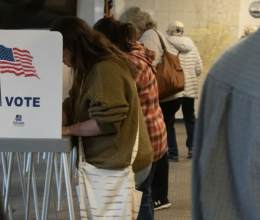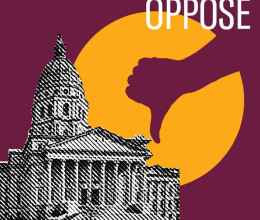Elections; voting procedures where proof of citizenship not provided.
TESTIMONY OF DOUG BONNEY
CHIEF COUNSEL AND LEGAL DIRECTOR, AMERICAN CIVIL LIBERTIES UNION OF KANSAS
IN OPPOSITION TO SB 37
KANSAS SENATE ETHICS, ELECTIONS, AND LOCAL GOVERNMENT COMMITTEE
FEBRUARY 7, 2017
Thank you, Chair Bowers, and members of the Ethics, Elections, and Local Government Committee for affording us the opportunity to provide testimony on SB 37.
The American Civil Liberties Union (ACLU) of Kansas is a non-partisan, non-political membership organization dedicated to preserving and strengthening the constitutional liberties afforded to every resident of Kansas. We work to preserve and strengthen our constitutional rights and freedoms through policy advocacy, litigation, and education. We proudly serve over 10,000 supporters in Kansas and represent more than 1 million supporters nationwide.
The ACLU of Kansas strongly opposes SB 37. SB 37 would create a two-tiered system of voting in Kansas, based purely on the method an individual chooses to use to register to vote. The bill attempts to circumvent numerous court rulings and would result in tens of thousands of Kansans losing the right to vote in state and local elections.
The ACLU of Kansas opposes SB 37 because:
- In 2016, a court issued a permanent injunction against the Secretary of State’s effort to implement the very system he is asking the Legislature to endorse here today. The ACLU brought that case against the Secretary of State on behalf of clients across the state. One of our clients was Marvin Brown, a 91 year-old World War II veteran. Under the two-tiered system that SB 37 seeks to create, Mr. Brown would be prevented from voting for state and local offices. He was able to vote in all elections in the fall because the court enjoined Sec. Kobach from creating a manifestly unfair system.
- The bill would disenfranchise at least 18,000 citizens. In issuing its injunction in the fall, the court found that the system being proposed today would have caused “the loss of the right to vote for more than 18,000” Kansas citizens in state and local elections.1
- This bill would create an illogical and confusing two-tiered voting system. It simply makes no sense to permit voters to vote for federal offices like President and Congress but not for local and state offices like school board and state legislature. A two-tiered voting system would sow confusion among the voters and unnecessarily disenfranchise a large number of Kansas citizens. The proposed cure is far worse than the hypothetical disease it aims to treat.
- This bill is simply a misguided effort to salvage any shred of the Secretary of State’s failed and illegal “documentary proof of citizenship” requirement, which has been a disaster for voter registration and democracy in Kansas. Under the Secretary of State’s failed experiment, tens of thousands of voters have been blocked from registering. As of February 2016, more than 35,000 registrations in Kansas – or approximately 14% of all registrations since the requirement went into effect in 2013 – had been blocked.2 It is as if 1 out of 7 people who have tried to register to vote have had their applications thrown in the trash.
- The bill would contribute to what a federal court has already called the “mass denial of a fundamental constitutional right.” 3 Just last year, the U.S. Court of Appeals for the Tenth Circuit ruled against the documentary proof of citizenship requirement. In the court’s opinion, Judge Jerome Holmes, appointed to the bench by President George W. Bush, wrote that the documentary proof of citizenship law has caused a “mass denial of a fundamental constitutional right.” Judge Holmes further noted that Secretary Kobach’s “assertion that the ‘number of aliens on the voter rolls is likely to be in the hundreds, if not thousands’ is pure speculation.”4 If that is true for federal elections, it is equally true for state elections.
- Voter registration by non-citizens is simply not a real problem in Kansas or elsewhere. To the extent any non-citizens might register and vote in Kansas, state law already provides tools to address such misconduct, and those alternatives are effective and do not increase barriers for eligible voters. There is zero evidence that non-citizens are registering to vote in Kansas or anywhere else. Even if the phenomenon were real, however, Kansas law provides ample tools to combat it. Among those tools is the Secretary of State’s power to prosecute voting crimes. Alone among the nation’s secretaries of state, Secretary Kobach has the power to prosecute. It is telling that, of the tiny handful of cases he has brought in the nearly two years that he has possessed this unique power, the Secretary of State has not brought a single case against a non-citizen for registering or voting.
On behalf of the ACLU of Kansas we strongly encourage you to reject SB 37.
1 Brown v. Kobach, Case No. 2016-CV-550 (Shawnee County Dist. Ct., Nov. 4, 2016) at 18.
2 See John Eligon, A.C.L.U. Challenges Kansas Voter Law Requiring Proof of Citizenship, N.Y. Times, Feb. 18, 2016, http://www.nytimes.com/2016/02/19/us/aclu-challenges-kansas-voter-law-re....
3 Fish v. Kobach, 840 F.3d 710, 755 (10th Cir. 2016).
4 Fish v. Kobach, 840 F.3d 710, 755 (10th Cir. 2016).7



